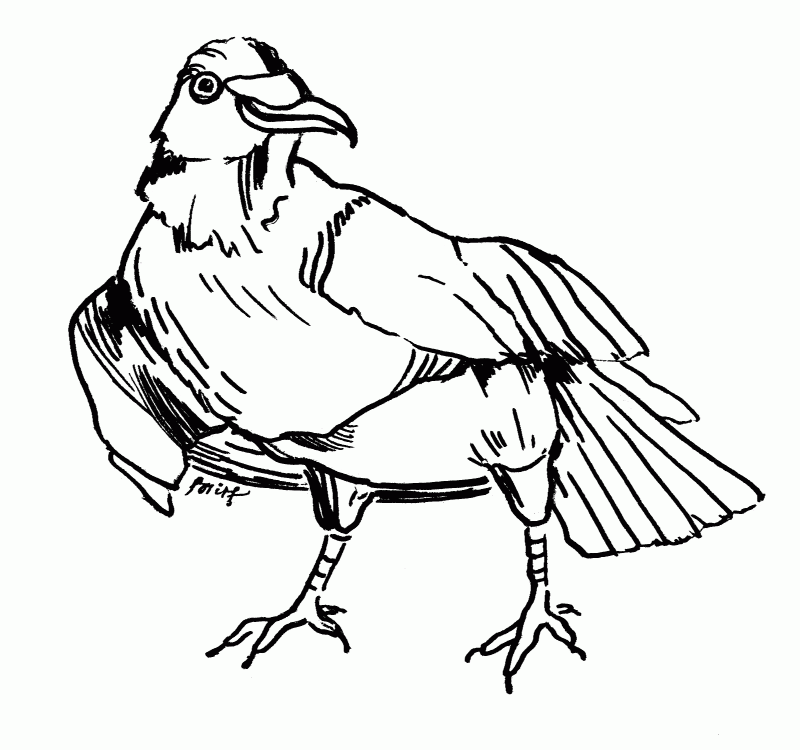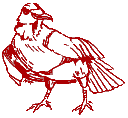Euclid, the Crow
 The fiercely intelligent-looking bird is a crow by the name of "Euclid Cornwallis vanderKroew", or simply "Euclid" for short. More specifically, he is an American Crow, Corvus brachyrhynchos. The American Crow is distinctly North American. Distinctively, it is entirely black, from its iridescent black feathers to its black legs, feet, and bill. Audibly, the American Crow is recognizable by its short and loud "caah-caah-caah" call.
The fiercely intelligent-looking bird is a crow by the name of "Euclid Cornwallis vanderKroew", or simply "Euclid" for short. More specifically, he is an American Crow, Corvus brachyrhynchos. The American Crow is distinctly North American. Distinctively, it is entirely black, from its iridescent black feathers to its black legs, feet, and bill. Audibly, the American Crow is recognizable by its short and loud "caah-caah-caah" call.
Crows are noted for their intelligence, having the largest brains, relative to body size, of any bird species. Indeed, some crows have been known to dominate much larger animals of other species, among them dogs and cats. Crows are sometimes described as tool users since they are known to smash hard-shelled clams and walnuts on pavements to crack them open.
Science writer David Quammen believes[1] -- not entirely tongue-in-cheek -- that crows are simply too smart for their own good.
Crows are bored. They suffer from being too intelligent for their station in life. Respectable evolutionary success is simply not, for these brainy and complex birds, enough. They are dissatisfied with the narrow goals and horizons of that tired old Darwinian struggle. On the lookout for a new challenge. See them there, lined up conspiratorially along a fence rail or a high wire, shoulder to shoulder, alert, self-contained, missing nothing. Feeling discreetly thwarted. Waiting, like an ambitious understudy, for their break. Dolphins and whales and chimpanzees get all the fawning publicity, great fuss made over their near-human intelligence. But don't be fooled. Crows are not stupid. Far from it. They are merely underachievers. They are bored.
He supports his case by pointing out that crows are playful and often frivolous. The play catch, they juggle, they play a kind of rugby with small stones,
And they have a comedy-acrobatic routine: allowing themselves to tip backward dizzily from a wire perch, holding a loose grip so as to hang upside down, spreading out both wings, then daringly letting go with one foot; finally switching feet to let go with the other. Such shameless hot-dogging is usually performed for a small audience of other crows.
We chose the American Crow as the mascot for Scienticity largely for the curiosity and intelligence for which it is noted, two characteristics that we'd like to associate with the project and with those we hope will benefit from it. However, we won't deny that the crow's apparent sense of humor had its attractions.
Euclid was drawn for us by Faith Leahy-Thielke, in a portrait that delightfully captures the intelligence, curiosity, and impish humor of this complex animal.
Notes
[1] David Quammen, "Has Success Spoiled The Crow? The Puzzling Case File on the World's Smartest Bird", from his book Natural Acts : A Sidelong View of Science and Nature (New York : Schocken Books, 1985).
